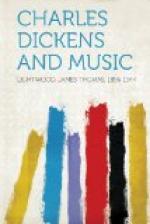Half a pound of tuppenny rice,
Half a pound of
treacle,
That’s the way the money
goes,[9]
Pop goes the weasel.
Many explanations have been given of ‘weasel.’ Some say it was a purse made of weasel skin; others that it was a tailor’s flat-iron which used to be pawned (or ‘popped’) to procure the needful for admission to the tavern. A third (and more intelligible) suggestion is that the line is simply a catch phrase, without any meaning.
There is a notable reference to the organ in Little Dorrit. Arthur Clennam goes to call on old Frederick Dorrit, the clarionet player, and is directed to the house where he lived. ’There were so many lodgers in this house that the door-post seemed to be as full of bell handles as a cathedral organ is of stops,’ and Clennam hesitates for a time, ’doubtful which might be the clarionet stop.’
Further on in the same novel we are told that it was the organ that Mrs. Finching was desirous of learning.
I have said ever since I began
to recover the blow of
Mr. F’s death that I
would learn the organ of which
I am extremely fond but of
which I am ashamed to say
I do not yet know a note.
The following fine description of the tones of an organ occurs in The Chimes:
The organ sounded faintly in the church below. Swelling by degrees the melody ascended to the roof, and filled the choir and nave. Expanding more and more, it rose up, up; up, up; higher, higher, higher up; awakening agitated hearts within the burly piles of oak, the hollow bells, the iron-bound doors, the stairs of solid stone; until the tower walls were insufficient to contain it, and it soared into the sky.
The effect of this on Trotty Veck was very different from that which another organ had on the benevolent old lady we read of in Our Parish. She subscribed L20 towards a new instrument for the parish church, and was so overcome when she first heard it that she had to be carried out by the pew-opener.
There are various references to the organs in the City churches, and probably the description of one of them given in Dombey and Son would suit most instruments of the period.
The organ rumbled and rolled
as if it had got the
colic, for want of a congregation
to keep the wind
and damp out.
Barrel-Organ
In real life the barrel-organ was a frequent source of annoyance to Dickens, who found its ceaseless strains very trying when he was busy writing, and who had as much trouble in evicting the grinders as David Copperfield’s aunt had with the donkeys.
However, he takes a very mild revenge on this deservedly maligned instrument in his works, and the references are, as usual, of a humorous character. A barrel-organ formed a part of the procession to celebrate the election of Mr. Tulrumble[10] as Mayor of Mudfog, but the player put on the wrong stop, and played one tune while the band played another.




